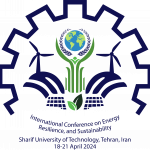Increasing energy demand associated with the human development and industrialization lead to tremendous usage of fossil energies. This caused critical challenges to the environment such as climate change, availability of resources, waste disposal, air pollution, etc. The evidences of them are approved in many international agencies, events, and reports like IPCC, United Nations. Thus, the sustainable design of energy systems becomes an important issue in all countries. Their cover becomes the topics of politicians, policy-makers, scientists, and experts in academics, industry, and society. This may threaten the future development of countries and may provide some opportunities for them in case of careful consideration. This needs the cooperation between countries in the air pollution, water resources, embedded carbon, etc. Some challenges are not only restricted to the consumers of energy and even the exported energy countries must be involved and take serious actions for future developments. In this context, this event is held to present the recent novel ideas in the science and technology and provide a framework to discuss these issues for the academics and society.
The circular economy and closed loop supply chain approaches, try to depict the sustainable eco-efficient design of energy system. To assess the sustainability, several methods have been developed such as Life Cycle Analysis (LCA), Material Flow Analysis (MFA), Eco-efficiency, energy analysis, environmental labels, etc. The interrelationships between energy and other sections like water, climate, land, and health necessitate us to consider their trade-off to ensure the sustainable path to the circular and green economy for protecting our valuable environment. The Nexus approach considers these interdependencies in the governance, planning, design, and education of energy systems. The efficient use of resources, maximizing renewable energy applications, minimizing wastes, water consumption, increasing energy efficiency, industrial ecology, utilizing symbiosis, and co-benefit assessments may provide these opportunities for our future sustainable and resilient energy systems. Main breakthroughs in the science and technology on these issues will be discussed on ICERS2024. These topics are open to discuss in the conference. Some of them are listed below:
- Low carbon economy
- Circular economy
- Life cycle analysis
- Nexus approach
- Decarburization of energy system
- Water and energy
- Waste management
- Waste water treatment
- Air Pollution and climate change
- Co-benefit assessment
- Sustainability assessment
- Impact assessment
- Industrial ecology
- Efficient use of resources
- Eco-labels
- Green House Gas (GHG) inventories and carbon footprint
- Environmental impact assessment
- Environmental management


